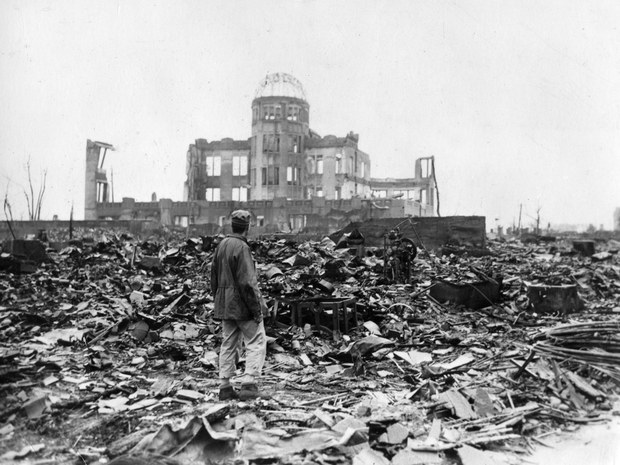The Controversy of Dropping the Atomic Bomb: An Interview with Three College Students
By Eleni Demos
The atomic bomb is a controversial subject that some choose not to discuss, but given the recent threat of nuclear terror on the US, the subject is more relevant than ever. How do college students, born decades after the drop on Hiroshima and Nagasaki, feel about the subject?
I interviewed three college students at Fitchburg State University to find out what they knew about the atomic bomb drop on Japan and how they felt about the decision. Benjamin D. Thompson, Kaitlin P. Schultz, and Alex Kresock all have varying opinions on the historic drop.
Do you believe dropping the atomic bomb on Hiroshima and Nagasaki was a good idea or a bad idea?
Thompson: “Dropping the atomic bomb was a necessary evil. Countless more lives could have been lost in an invasion of Japan. The drop would have prolonged the war, and been more costly.”
Shultz: "I believe it was a good thing because it showed that the U.S had more power and had the ability to win during a battle.”
Kresock: “The dropping of the Atomic Bomb was a bad idea. FDR did not wish to go to such lengths to have to drop the atomic bomb. He died before we dropped them so he never had the final say. On July 26, 1945, President Truman initiated the Potsdam Declaration, which was an ultimatum in which we threatened to use utter destruction to settle the war. Japan had ignored the ultimatum and we felt that we had no other choice than to use the atomic bomb despite not wanting to. Even Julius Robert Oppenheimer said after he created the atomic bomb, ‘Now I am become death, the destroyer of worlds’. This is a religious term referring to the unknown catastrophic power his invention was capable of.”
“Now I am to become Death, the destroyer of worlds.”
Do you believe there might have been another way the war could have ended if the United States didn’t drop the bomb?
T: “I was not in the oval office at the time the decision was made by President Harry S. Truman. So I am not aware of the alternatives.”
S: “I think there could have been multiple different outcomes, but American scientists would’ve found a way to adapt to Japanese war tactics.”
K: “The Biggest obstacle we had was the guerrilla war battle with the Japanese during the battle of Okinawa. Had we succeeded at Okinawa before Germany surrendered the allies would have most likely launched a full scale military invasion similar to how we invaded Berlin Germany. However after Germany surrendered our focus in the pacific, shifted a bit more towards liberation in Europe. But basically our original plan was a full scale allied invasion of Japan and take control of the country until Japan surrendered.”
PC: The New Yorker
Could you please give at least one way you would’ve chosen to end the war?
T: “If it were possible, it would have been nice to end the war with a peace treaty among all the nations involved.”
S: “I would’ve given Japan the opportunity to surrender along with a warning that if they did not America’s strong war tactics would be placed into play.”
K: “I probably would have made contact with all allied military forces and created some sort of military boundary around Japan using ground, naval, and air, so that we could basically alienate Japan and use these military forces to move towards Tokyo so that we could give them some sort of ultimatum or peace treaty proposal. "
The answers provided by the students showed that some were more knowledgable about the drop than others. Some thought the decision was necessary while others felt it could have been avoided entirely. With the threat of nuclear terror on the horizon, knowledge of the past is the strongest tool in our arsenal.
The atomic bomb may seem like a piece of ancient history, but will history repeat itself?

